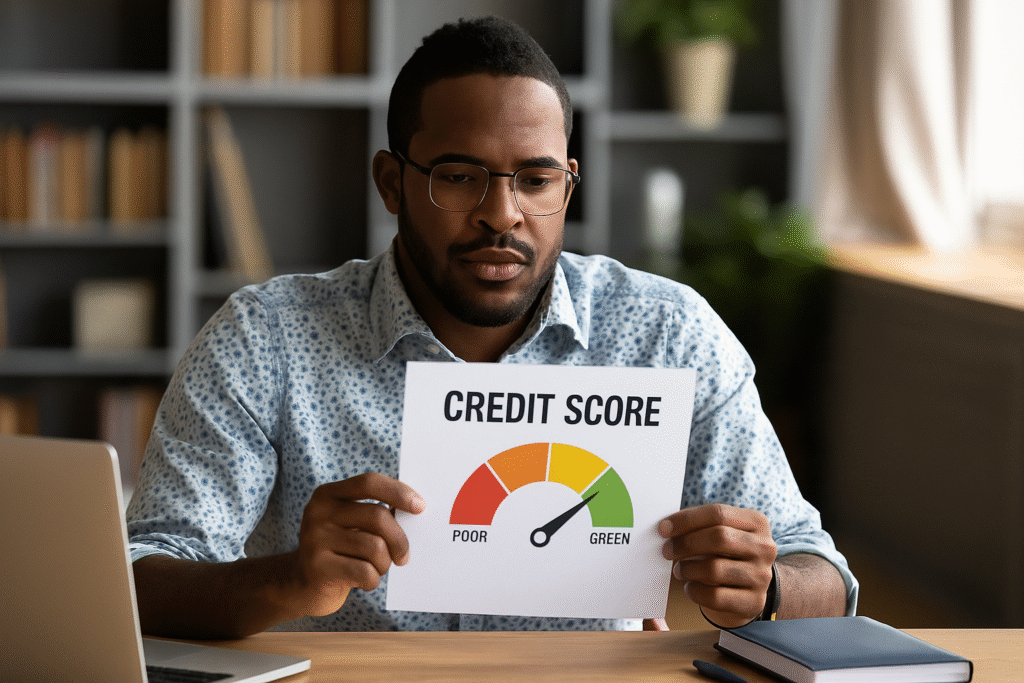Improving your credit score can be a mystery, but it doesn’t have to be. Whether you are looking to buy a home, take out a business loan, or just get a credit card with better perks, credit scores are important to your future financial well-being. Fortunately, there are tried and true methods for raising your credit score quickly and easily.
In this guide, we will reveal the secrets to improving your credit score fast. We will also explain how credit scores are calculated and what affects your credit score, and steps you can take today.
Understanding Credit
What is a Credit Score?
A credit score is a three-digit number that illustrates your creditworthiness. Lenders use this score to decide how risky it would be to lend you money. The higher the credit score, the more trustworthy you appear to banks, credit card companies, and financial institutions.
Most credit scores run on a 300 to 850 scale, and typically fall under the following breakdowns:
• Excellent (750–850): Best deals for rates and loans.
• Good (700–749): Good chance of approval with a competitive rate.
• Fair (650–699): Probably meets the requirements but at a higher rate.
• Poor (600–649): Very few options available with high costs.
• Bad (below 600): Very hard to get approved for loans.
Why Is Your Credit Score Important?
Your credit score will impact your life in more ways than just loans:
• Interest Rate: Better scores mean lower interest rates.
• Credit Approval: Better scores means better chance of getting credit approvals on cards and loans.
• Insurance Premiums: Some insurance companies will check your credit.
• Employment: Some employers check your credit history report.
• Housing: Some landlords include a credit check during the application.
What Factors Impact Your Credit Score?
To improve your credit you will need to recognize what impacts your credit. The main scoring model is called FICO and uses the following factors:
- Payment History (35%) – The biggest factor in your score is paying your bills on time
- Credit Utilization (30%) – indicates how much of your available credit you are presently using
- Length of Credit History (15%) – Longer accounts can positively affect your score
- New Credit (10%) – Too many credit applications for new accounts can hurt your score.
- Credit (10%) – Having credit mix is beneficial (i.e Annual fee Credit Card, Installment loan).
How to Quickly Raise Your Credit Score?
Now let’s get into the real secrets on how to quickly raise your credit score.
- Pay Down Your Debt Smarter
The quickest way to make a difference is with your debt payments. Pay down:
- High-interest credit card debt – This debt is the most detrimental to your finances.
- The smallest debt balances – Paying off a small balance can show multiple accounts with balances paid in full.
- Use either debt snowball or debt avalanche method, depending on what method motivates you the most.
2. Lower Your Credit Utilization Ratio
This category is also one of the two most influential aspects of your score. You should ideally keep utilization under 30%, although keeping it under 10% usage utilization is even better.
Ways to lower utilization:
- Pay off your balance before the billing cycle ends.
- Call your card provider and ask for a credit limit increase.
- Avoid maxing out a card by spreading your spending around other credit cards.
3. Make Payments on Time
Even one late payment can significantly lower your score. Set up:
- Ron automatic payments based on your minimum payment balances.
- Reminders of due dates.
- Tracking on a calendar to track due dates and not miss them.
4. Ask to be Added as an Authorized User
If any of your friends or family have a credit card account that has a great history, ask if they would add you as an authorized user on their account. Their good habits will automatically improve your credit file.
- Review Your Credit Report for Mistakes
It truly is astonishing, but 20% of reports contain errors that will negatively impact your score. You can obtain free credit reports from AnnualCreditReport.com and report any inaccuracies- including:
• Accounts you don’t recognize,
• Wrong balances, and
• Wrongfully reported late payments. - Limit Hard Inquiries
A hard inquiry happens each time you apply for credit. A lot of inquiries will ultimately lower your score. Only space out the applications, and only apply when you need to. - Increase Your Variety of Credit Mix
If you don’t have anything besides credit cards, consider taking out a small personal loan or auto loan. Having a mix of credit varieties increases your credit portfolio. - Ask Your Creditors
You may be surprised to find that your creditors may be willing to remove marks for late payments if you only ask. Goodwill adjustments may work better if you are typically a punctual payer. - Use Secured Credit Cards
If your score is extremely low, then a secured credit card is a great option for building or rebuilding credit. You will deposit money upfront, and the the secured card issuer will report your payments to the credit bureaus.
Advanced Credit Repair Secrets
Credit Piggybacking
This method consists of getting yourself added to another person’s old account, that had a well-maintained history. This should add substantial value to your profile because of the long, well-maintained history.
Debt Consolidation Loans
Taking multiple high-interest rate cards and transferring them into one loan at a lower interest, may decrease utilization rates and may allow payment to be simplified.
Rent and Utility Payment Reporting
Bureaus do not, by default, include things like your rent and utility bills. You can build credit without credit cards through services like Experian Boost by adding your rent and utility payments to your credit report.
Credit Builder Loans
Some national banks have a product called Credit Builder Loans or would call them something similar. In short, instead of your regular payment going to pay down the loan principal, the payment is placed in a savings account. When you finish paying the loan, you get all of your money back plus a better score.
Common Mistakes to Avoid
Closing Old Accounts
Many people are surprised to find out that closing old cards is not a good idea. Although, closing an old card will help avoid an annual fee; you will be shortening your historical time frame and lowering your available credit at the same time, which will negatively impact your score.
Applying for too Many Cards
Each time you apply for a card, a hard inquiry is initiated. If you apply for too many cards in a short amount of time, it may alarm lenders because you appear to represent some sort of risk.
Ignoring Collection Accounts
Allowing account(s) go unpaid will only hurt your score in the future. Negotiate with the accounts that you can and settle with at least some, if you can.
How long will it take to improve my score?
• 30 Days: Pay off small balances, correct mistakes, and lower utilization.
• 3 Months: Create patterns of making on-time payments consistently.
• 6-12 Months: With some real habits, you’ll see some noticeable improvement.
• 12-Plus Months: You will have the potential for excellent credit assuming you stay disciplined.
Final Thoughts
Improving your credit score isn’t about quick hacks. It is about strategies you can implement preventingively to build a strong credit score. You can start to greatly increase your credit scores in a few months by paying down your debts, paying your bills on time, correcting any mistakes, and being responsible by making much use of secured credit cards or become an authorized user on someone’s account.
Having strong credit scores insures you will have financial flexibility, lower interest rates and most importantly, less stress. Start using these tips today and the future availability of funding, your financial freedom will grow.

